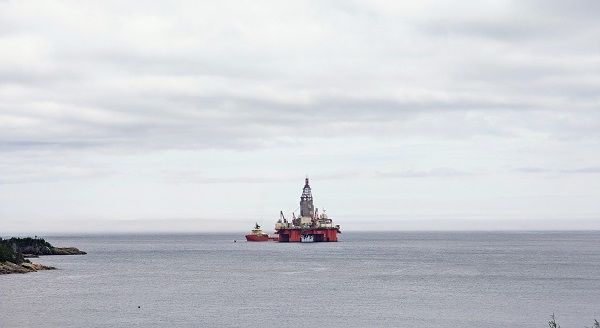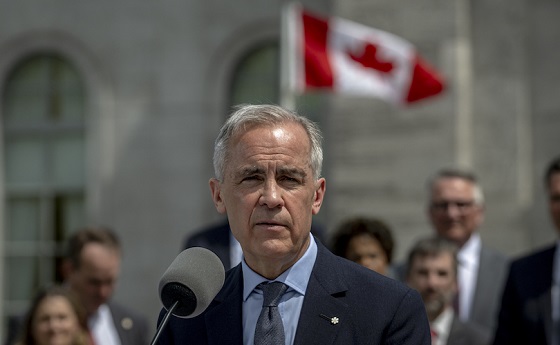Energy
There is no better time for the Atlantic to follow the Pacific as the next stage of Canadian energy development

Premier Tim Houston says it’s time for Nova Scotia to develop its energy industry
In late January, Nova Scotia Premier Tim Houston announced that natural resources would become a major focus of his government, stating that it was time to, “We can’t expect Nova Scotia to prosper when we ban industry after industry after industry.”
It was announced that his government would look into fracking for natural gas, uranium mining, and lifting fossil fuel extraction moratoriums along the coast.
Atlantic Canada is poised to become the next major player in Canada’s energy expansion. With growing global demand for clean energy, a shift toward resource independence, and the looming threat of U.S. tariffs, provinces like Newfoundland and Labrador and Nova Scotia are taking bold steps to develop their energy sectors. Recent developments in liquefied natural gas (LNG), offshore oil, green hydrogen, and critical minerals are positioning the region as a crucial pillar of Canada’s energy future.
Donald Trump’s threats to impose tariffs on Canadian energy exports have forced Canada to reassess its reliance on the United States as its primary customer. This shift has already played out in Quebec, where the government is reconsidering its stance on LNG projects. Similarly, Atlantic Canada recognizes the need to diversify its energy exports to Europe and Asia. With vast offshore oil reserves and new LNG projects in the works, the region is set to capitalize on international markets.
Premier Houston has emphasized the importance of local resource development to secure the province’s economy. Though he has walked back on previous comments about revisiting the Georges Bank offshore drilling moratorium, his government is clearly focused on increasing natural resource production. The seafood industry, a vital component of the region’s economy, has expressed concerns about potential energy developments affecting fisheries, but a balance must be struck to ensure both industries thrive.
Newfoundland and Labrador Premier Andrew Furey has made it clear that offshore oil will continue to play a key role in the province’s economy for decades. Addressing industry leaders, Furey positioned Newfoundland as the future “energy capital of North America,” highlighting new offshore projects and hydrogen development. ExxonMobil’s $1.5 billion investment in offshore infrastructure underscores industry confidence in the region’s potential.
Despite dubious global forecasts suggesting oil demand will peak in the coming years, Newfoundland and Labrador believes its high-quality, low-emission crude will remain in demand, particularly in Europe and Asia. Additionally, the province is exploring hydrogen production, backed by federal incentives and private investment. Companies like World Energy GH2 are pushing forward with large-scale green hydrogen projects, despite local opposition from residents concerned about the environmental impact of wind farms.
As British Columbia emerges as an LNG powerhouse, Atlantic Canada is following suit. The region’s proximity to European markets gives it a significant advantage, particularly in light of geopolitical instability affecting global energy supplies. With European nations scrambling to secure reliable energy sources, Atlantic Canada’s LNG potential is more valuable than ever.
Much like British Columbia, where First Nations have played a central role in LNG expansion, Atlantic Canada has an opportunity to develop Indigenous-led energy projects. Federal tax incentives and emissions regulations will shape how LNG projects move forward, ensuring they align with Canada’s climate commitments while driving economic growth.
The combination of Trump’s tariffs, shifting global energy markets, and renewed provincial interest in resource development has created a perfect storm for Atlantic Canada’s energy sector. With strong government backing, significant private investment, and growing international demand, the region is well-positioned to become a major energy player.
As Canada navigates this new era of energy expansion, Atlantic Canada’s strategic location, resource wealth, and commitment to innovation make it a natural frontier for growth. Whether through LNG, offshore oil, hydrogen, or critical minerals, the region’s energy sector is set to thrive in the coming decades.
Business
Carney budget doubles down on Trudeau-era policies

From the Fraser Institute
By Kenneth P. Green and Elmira Aliakbari
The Carney government tabled its first budget, which includes major new spending initiatives to promote a so-called “green economy,” and maintains greenhouse gas (GHG)-emission extinction as a central operating principle of Canadian governance.
The budget leaves untouched most of the legislative dampers on Canada’s fossil fuel sector (oil, gas, coal) of the last 10 years, while pouring still more money into theoretically “green” projects such as additional (and speculative new types) of nuclear power, electrical transmission to service “green” energy production, continued tax credits for alternative fuels such as hydrogen, and more. Adding insult to injury, the budget discusses “enhancing” (read: likely increasing) the carbon tax on industrial emitters across Canada, and tightening controls over provinces to ensure they meet new federal tax targets.
Over the past decade, Ottawa introduced numerous regulations to restrict oil and gas development and again accelerate the growth of the green sector. Key initiatives include Ottawa’s arbitrary cap on GHG emissions for the oil and gas sector, which will restrict production; stricter regulations for methane emissions in the oil and gas industry, which will also likely restrict production; “clean electricity” regulations that aim to decarbonize Canada’s electricity generation; Bill C-69 (which introduced subjective ill-defined criteria into the evaluation of energy projects); and Bill C-48, known as the oil tanker ban on the west coast, which limits Canadian exports to Asian and other non-U.S. markets.
At the same time, governments launched a wide range of spending initiatives, tax credits and regulations to promote the green economy, which basically includes industries and technologies that aim to reduce pollution and use cleaner energy sources. Between 2014/15 and 2024/25, federal spending on green initiatives (such as subsidizing renewable power, providing incentives for electric vehicles and charging infrastructure, funding for building retrofits, and support for alternative fuels such as hydrogen, etc.) went from $0.6 billion to $23 billion—a 38-fold increase. Altogether, since 2014, Ottawa and provincial governments in the country’s four largest provinces (Ontario, British Columbia, Quebec and Alberta) have spent and foregone revenues of at least $158 billion to promote the green sector.
Yet, despite the government’s massive spending and heavy regulation to constrain the fossil fuel industry and promote the green sector, the outcomes have been extremely disappointing. In 2014, the green sector accounted for 3.1 per cent of Canada’s economic output, and by 2023, that share had only slightly grown to 3.6 per cent. Put simply, despite massive spending, the sector’s contribution to Canada’s economy has barely changed. In addition, between 2014 and 2023, despite billions in government spending to promote the green sector, only 68,000 new jobs were added in this sector, many of them in already established fields such as waste management and hydroelectric power. The sector’s contribution to national employment remains small, representing only 2 per cent of total jobs in the country.
Not surprisingly, this combination of massive government spending and heavy-handed regulation have contributed to Canada’s economic stagnation in recent years. As documented by our colleagues, Canadian living standards—measured by per-person GDP—were lower in the second quarter of 2025 than six years earlier, suggesting we are poorer today than we were six years ago.
But for Prime Minister Carney, apparently, past failures do not temper future plans, as the budget either reaffirms or expands upon the failed plans of the past decade. No lessons appear to have even been considered, much less learned from past failures.
There had been some hope that Carney’s first budget would include some reflection of how badly the natural resource and energy policies of the Trudeau government have hurt Canada’s economy.
But other than some language obfuscation—“investment” vs. “spending,” “competitiveness” of GHG controls (not economy), and the “green” energy economy vs. the “conventional” energy economy—this is a Trudeau-continuance business-as-usual agenda on steroids. Yes, they will allow some slight deceptive rollbacks to proceed (such as rolling the consumer carbon tax into the industrial carbon tax rather than eliminating it), and may allow still more carbon taxes to render at least one onerous Trudeau-era regulation (the oil and gas cap) to be rendered moot, but that’s stunningly weak tea on policy reform.
The first Carney budget could and likely will, if passed, continue the economic stagnation plaguing Canada. That does not bode well for the future prosperity of Canadians.
Daily Caller
UN Chief Rages Against Dying Of Climate Alarm Light


From the Daily Caller News Foundation
The light of the global climate alarm movement has faded throughout 2025, as even narrative-pushing luminaries like Bill Gates have begun admitting. But that doesn’t mean the bitter clingers to the net-zero by 2050 dogma will go away quietly. No one serves more ably as the poster child of this resistance to reality than U.N. chief Antonio Guterres, who is preparing to host the UN’s annual climate conference, COP30, in Brazil on Nov. 10.
In a speech on Monday, Guterres echoed poet Dylan Thomas’s advice to aging men and women in his famed poem, “Do not go gentle into that good night:”
Do not go gentle into that good night,
Old age should burn and rave at close of day;
Rage, rage against the dying of the light.
Dear Readers:
As a nonprofit, we are dependent on the generosity of our readers.
Please consider making a small donation of any amount here.
Thank you!
Though wise men at their end know dark is right,
Because their words had forked no lightning they
Do not go gentle into that good night.
Seeing that his own words have “forked no lightning,” Guterres raged, raged against the dying of the climate alarm light.
“Governments must arrive at the upcoming COP30 meeting in Brazil with concrete plans to slash their own emissions over the next decade while also delivering climate justice to those on the front lines of a crisis they did little to cause,” Guterres demanded, adding, “Just look at Jamaica.”
Yes, because, as everyone must assuredly know, the Earth has never produced major hurricanes in the past, so it must be the all-powerful climate change bogeyman that produced this major storm at the end of an unusually slow Atlantic hurricane season.
Actually, Guterres’ order to all national governments to arrive in Belem, Brazil outfitted with aspirational plans to meet the net-zero illusion, which everyone knows can and will never be met, helps explain why President Donald Trump will not be sending an official U.S. delegation. Trump has repeatedly made clear – most recently during his September speech before the U.N. General Assembly – that he views the entire climate change agenda as a huge scam. Why waste taxpayer money in pursuit of a fantasy when he’s had so much success pursuing a more productive agenda via direct negotiations with national leaders around the world?
“The Green New Scam would have killed America if President Trump had not been elected to implement his commonsense energy agenda…focused on utilizing the liquid gold under our feet to strengthen our grid stability and drive down costs for American families and businesses,” Taylor Rogers, a White House spokeswoman, said in a statement to the Guardian. “President Trump will not jeopardize our country’s economic and national security to pursue vague climate goals that are killing other countries,” she added.
The Guardian claims that Rogers’s use of the word “scam” refers to the Green New Deal policies pursued by Joe Biden. But that’s only part of it: The President views the entire net-zero project as a global scam designed to support a variety of wealth redistribution schemes and give momentum to the increasingly authoritarian forms of government we currently see cracking down in formerly free democracies like the U.K., Canada, Germany, France, Australia and other western developed nations.
Trump’s focused efforts on reversing vast swaths of Biden’s destructive agenda is undoing 16 years of command-and-control regulatory schemes implemented by the federal government. The resulting elimination of Inflation Reduction Act subsidies is already slowing the growth of the electric vehicles industry and impacting the rise of wind and solar generation as well.
But the impacts are international, too, as developing nations across the world shift direction to be able to do business with the world’s most powerful economy and developed nations in Europe and elsewhere grudgingly strive to remain competitive. Gates provided a clear wake-up call highlighting this global trend with his sudden departure from climate alarmist orthodoxy and its dogmatic narratives with his shift in rhetoric and planned investments laid out in last week’s long blog post.
Guterres, as the titular leader of the climate movement’s center of globalist messaging, sees his perch under assault and responded with a rhetorical effort to reassert his authority. We can expect the secretary general to keep raging as his influence wanes and he is replaced by someone whose own words might fork some lightning.
David Blackmon is an energy writer and consultant based in Texas. He spent 40 years in the oil and gas business, where he specialized in public policy and communications.
-

 Justice1 day ago
Justice1 day agoCarney government lets Supreme Court decision stand despite outrage over child porn ruling
-

 Daily Caller2 days ago
Daily Caller2 days agoUS Eating Canada’s Lunch While Liberals Stall – Trump Admin Announces Record-Shattering Energy Report
-

 Business1 day ago
Business1 day agoCarney’s budget spares tax status of Canadian churches, pro-life groups after backlash
-

 COVID-191 day ago
COVID-191 day agoFreedom Convoy leader Tamara Lich to appeal her recent conviction
-

 Business2 days ago
Business2 days agoThe Liberal budget is a massive FAILURE: Former Liberal Cabinet Member Dan McTeague
-

 Daily Caller1 day ago
Daily Caller1 day agoUN Chief Rages Against Dying Of Climate Alarm Light
-

 Business2 days ago
Business2 days agoPulling back the curtain on the Carney government’s first budget
-

 Energy2 days ago
Energy2 days agoEby should put up, shut up, or pay up











